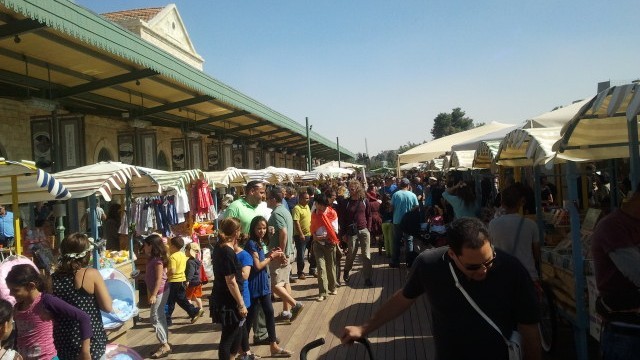Living in Jerusalem is a deeply spiritual experience.
Shabbat in Jerusalem is incomparable. I’ve lived for five months in Tel Aviv, where bars, grocery stores and shops are still open on Shabbat. Shabbat in Jerusalem, on the other hand, looks like an apocalyptic zombie dead zone with less tumbleweeds. Run out of dish soap? Toilet paper? Better hope you have some stockpiled : )
Jokes aside, it’s magical. Most Shabbat mornings I will go on a walk or run through the newly renovated (old) Jerusalem train station and watch hundreds of young Jewish families pushing babies on strollers and walking their dogs in the peaceful warm air.
The buses in the city don’t run until Shabbat is over, compelling us to relax, breathe and be unproductive. Luckily, I haven’t had to wait till Friday evening to experience a Shabbat in my week, but I’ll get to that later.
This week’s Torah portion begins with Moses atop Mount Sinai; he receives the Ten Commandments and a set of verses (V’shamru) commanding us to keep Shabbat as a sign of covenant with God. Good stuff. The Israelites were probably looking forward to go on a “House of Cards” level binge-read of the divine laws Moses was bringing down? Right? Not quite. Aaron, yikes namesake, made the Israelites a golden calf as a “replacement” God. Moses got upset and broke the tablets. #AngerProbs
So why is Shabbat important?
I’ll get there.
The concept of Shabbat comes from the seven-day creation in Genesis. There was nothing, then God “created” heaven and earth and at the end of the process, god “rested.” Both God’s “rest” and “creation” are deeply anthropomorphic terms. We (humans) work in finite, reliant upon time, space, and matter. God’s transcendence allows the “creation” of something (matter) from nothing (yesh m’ein). In Kabbalistic writings the ein (nothing) in yesh m’ein (something from nothing) refers to the Ein Sof, the “Infinite”. God is “without limits”/Ein Sof and therefore “existed” prior to his self-manifestation in the spiritual realm/universe. This helps us understand that God existed in the “nothingness” before our world. Still with me?
Think of it like a math problem.
If you have infinity and you add a finite sum, like 42. The sum total is infinite. Thus the “sum total” of the world/reality is infinite.
How does this affect our understanding of creation? “Creation” is not the result of God adding something finite (trees, rivers, earth); it is the result of God holding back infinity. This “holding back” or “contraction” is known in Kabbalah as tzimtzum.
God holds back infinity for six days and on the seventh day God reverts back to infinity.
Did you notice the inverse relationship we have with God? God has to “hold back” for six days in order to create while we work. God goes into his default, omnipotent, omniscient, “infinite mode” on Shabbat, while man holds back.
Rather than man being made in the image of God, it’s more like we are made in the mirror image of God. We commemorate the act of creation and pay homage to God through the imitation of God’s tzimtzum (contraction) on Shabbat.
Our day-to-day lives sometimes lack the “infinite.” They lack the eternal, and are stuck in the present.
I’ve done quite a lot of research online about this week’s parsha and many of the rabbis online juxtapose the “sin” of the Golden Calf with Shabbat. They lay out the preachy explanation that during the week we focus too much on work, materialism and consumerism. Offer an analogy comparing our normal lives to idolatry, and say that Shabbat renews ours covenant with God and thus is the antidote to the sin of the Golden Calf. I’m not saying that’s a bad interpretation. It just sounds a lot like…you’re not religious enough and your life is full of sin.
That’s not how I look at Shabbat.
These past few weeks I’ve been going through normal emotional ups and downs. Luckily, I’ve recently found an elite Taekwondo school to train with. I didn’t join the Taekwondo school in order to prepare myself to compete again. I joined because I missed the fight. I’ve been very fortunate to find a welcoming community, physical outlet and emotional catharsis. More importantly, I’ve been reminded of the value of the fight. In life we will face depression, heartbreak, failure, frailty etc., and these opponents will dwarf us. It was instilled in me from an early age in my Taekwondo career that there is nothing embarrassing about losing, but there is shame in not fighting. We have to fight the finite stresses of our lives, our fears, insecurities and negative thoughts.
You don’t have to believe in God to connect to Shabbat in this manner. As my favorite celebrity astrophysicist/man crush Neil Degrasse Tyson says, “We are all connected; to each other, biologically. To the earth, chemically. To the rest of the universe atomically.” He later says that, “we are in the universe and the universe is in us”.
We can’t send God a thank you Facebook message and the universe doesn’t have a phone number, but on Shabbat we can acknowledge and be grateful for our existence in space and time. It doesn’t matter whether you express your gratitude by following religious traditions by keeping Shabbat, enjoying the weather with a long walk by the lake, running through Jerusalem, calling up that friend you miss or performing your own art.
We all have so much to be grateful for in our finite lives; don’t take your place in the universe’s infinity for granted.
Shabbat Shalom.
ps. Hear Tyson answer the question of whether the universe is infinite with the analogy of a horizon that I promise not to compare to Shabbat’s sunrise/sunset. Here


